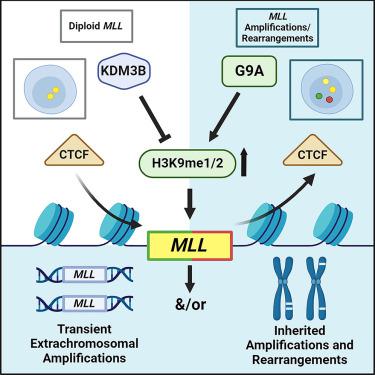Cell ( IF 45.5 ) Pub Date : 2023-10-02 , DOI: 10.1016/j.cell.2023.09.009 Zach H Gray 1 , Damayanti Chakraborty 2 , Reuben R Duttweiler 3 , Gulnaz D Alekbaeva 1 , Sedona E Murphy 2 , Kashish Chetal 4 , Fei Ji 4 , Benjamin I Ferman 1 , Madison A Honer 1 , Zhentian Wang 5 , Cynthia Myers 6 , Renhong Sun 7 , H Ümit Kaniskan 7 , Monika Maria Toma 8 , Elena A Bondarenko 1 , John N Santoro 1 , Christopher Miranda 1 , Megan E Dillingham 2 , Ran Tang 9 , Or Gozani 5 , Jian Jin 7 , Tomasz Skorski 8 , Cihangir Duy 1 , Hayan Lee 1 , Ruslan I Sadreyev 10 , Johnathan R Whetstine 3

|
MLL/KMT2A amplifications and translocations are prevalent in infant, adult, and therapy-induced leukemia. However, the molecular contributor(s) to these alterations are unclear. Here, we demonstrate that histone H3 lysine 9 mono- and di-methylation (H3K9me1/2) balance at the MLL/KMT2A locus regulates these amplifications and rearrangements. This balance is controlled by the crosstalk between lysine demethylase KDM3B and methyltransferase G9a/EHMT2. KDM3B depletion increases H3K9me1/2 levels and reduces CTCF occupancy at the MLL/KMT2A locus, in turn promoting amplification and rearrangements. Depleting CTCF is also sufficient to generate these focal alterations. Furthermore, the chemotherapy doxorubicin (Dox), which associates with therapy-induced leukemia and promotes MLL/KMT2A amplifications and rearrangements, suppresses KDM3B and CTCF protein levels. KDM3B and CTCF overexpression rescues Dox-induced MLL/KMT2A alterations. G9a inhibition in human cells or mice also suppresses MLL/KMT2A events accompanying Dox treatment. Therefore, MLL/KMT2A amplifications and rearrangements are controlled by epigenetic regulators that are tractable drug targets, which has clinical implications.
中文翻译:

表观遗传平衡确保 MLL 扩增和重排的机制控制
MLL/KMT2A 扩增和易位在婴儿、成人和治疗诱导的白血病中普遍存在。然而,这些改变的分子贡献者尚不清楚。在这里,我们证明组蛋白 H3 赖氨酸 9 单甲基化和二甲基化 (H3K9me1/2) 在 MLL/KMT2A 基因座的平衡调节这些扩增和重排。这种平衡由赖氨酸去甲基化酶 KDM3B 和甲基转移酶 G9a/EHMT2 之间的串扰控制。KDM3B 耗竭会增加 H3K9me1/2 水平并降低 CTCF 在 MLL/KMT2A 基因座的占有率,进而促进扩增和重排。耗竭 CTCF 也足以产生这些局灶性改变。此外,化疗阿霉素 (Dox) 与治疗诱导的白血病相关并促进 MLL/KMT2A 扩增和重排,抑制 KDM3B 和 CTCF 蛋白水平。KDM3B 和 CTCF 过表达挽救了 Dox 诱导的 MLL/KMT2A 改变。人细胞或小鼠中的 G9a 抑制也抑制伴随 Dox 治疗的 MLL/KMT2A 事件。因此,MLL/KMT2A 扩增和重排受表观遗传调节因子控制,这些调节因子是可处理的药物靶点,具有临床意义。















































 京公网安备 11010802027423号
京公网安备 11010802027423号